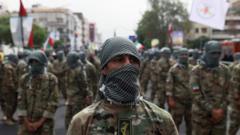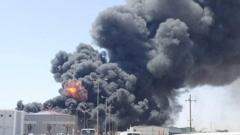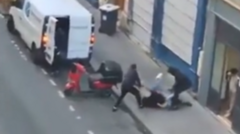Western intelligence reports indicate an alarming trend in Iran's use of criminal gangs for targeted attacks on dissidents abroad, raising security concerns globally.**
Iran's Covert Operations: Criminal Gangs Allegedly Engaged in Global Assassinations**

Iran's Covert Operations: Criminal Gangs Allegedly Engaged in Global Assassinations**
Recent investigations reveal Iran’s Revolutionary Guards are suspected of orchestrating overseas hits through organized crime.**
Iran has come under scrutiny for allegedly employing criminal organizations to execute targeted assaults on political dissidents, journalists, and other foes abroad. Western intelligence agencies report a significant uptick in these operations since 2022, including plans that potentially threatened notable figures such as former US President Donald Trump.
Recent arrests in the UK, linked to a suspected plan to attack the Israeli embassy in London, highlight this troubling trend. Court documents obtained by BBC investigations from Turkey and the US suggest the Islamic Revolutionary Guard Corps (IRGC) has turned to criminal syndicates for carrying out these foreign missions—claims the Iranian government has consistently denied.
Prominent among these investigations is the figure of Naji Sharifi Zindashti, an Iranian mob boss with a history of drug trafficking. Zindashti's name surfaces in various dubious cases, including the 2017 assassination of Saeed Karimian, a critic of the Iranian regime, and the more recent killing of Massoud Molavi, who exposed corruption within Iran's leadership. Zindashti, who faces mounting evidence of orchestrating these killings, is accused of having connections with Iranian intelligence agencies.
Notably, Zindashti is alleged to have communicated with a member of the Hells Angels for downing two Iranian defectors in Maryland, USA, a plan thwarted by the FBI. Additionally, links to international crime syndicates, particularly the Thieves-in-Law from the former Soviet Union, denote a collaborative approach for the IRGC's global hit operations.
Since the 2020 assassination of IRGC commander Qasem Soleimani, Iranian officials have allegedly plotted revenge against former US officials involved in his death. The US and UK governments have enacted sanctions against individuals connected to Iran’s alleged nefarious activities, compelled by a documented increase in credible threats associated with Iranian intelligence operations in these regions.
Recent incidents point to serious risks for individuals opposed to or criticized by the Iranian regime. The UK's counter-terrorism agency has noted a series of threats to journalists and activists linked to Iranian media networks. The growing unease mirrors actions taken in the past against dissenters, with leading voices like journalist Sima Sabet detailing attempts on her life that underscore the severity of these Iranian plots.
Historically, Iran's reliance on criminal elements for conducting foreign operations sheds light on its covert strategy to maintain plausibility in deniability while exerting influence through violence. As authorities gain awareness of these networks, the effort to disrupt Iran’s penetration into organized crime becomes crucial in the ongoing fight against targeted political violence on international grounds.




















